In short because C depends on E as you can see in the dependency-graph (O is object):

Python's method resolution order (MRO) works with the constraint that if a class a is a dependency of a class b, it is placed later in the queue than b.
Now more to the theory:
In Python, the MRO works with the following linearization rule:
L[C(B1 ... Bn)] = C + merge(L[B1] ... L[Bn], B1 ... Bn); and
L[object] = object
(source)
And the merge is defined as:
take the head of the first list, i.e L[B1][0]; if this head is not in the tail of any of the other lists, then add it to the linearization of C and remove it from the lists in the merge, otherwise look at the head of the next list and take it, if it is a good head. Then repeat the operation until all the class are removed or it is impossible to find good heads. In this case, it is impossible to construct the merge, Python 2.3 will refuse to create the class C and will raise an exception.
(source)
So for your case, it is, the first step is:
L[A] = A + merge(L[D],L[B],L[E])
Let us first resolve the recursive calls:
L[D] = D + merge(L[E],L[F]);
L[B] = B + merge(L[C],L[H]); and
L[E] = E + merge(L[G],L[H]).
And more recursion (we only do H once and do not redo E):
L[F] = F + merge(L[O]);
L[C] = C + merge(L[E],L[G]);
L[G] = G + merge(L[O]); and
L[H] = H + merge(L[O]).
Since L[O] is O and merge(a) (for one object is a) we thus have already obtained the sequence for H, G and F:
L[H] = (H, O).
L[G] = (G, O).
L[F] = (F, O).
Now we can calculate L[E]:
L[E] = E + merge( (G,O) , (H,O) ).
Since O is for both in the tail, it is placed last:
L[E] = (E,G,H,O).
Now we can calculate L[C]:
L[C] = C + merge( (E,G,H,O) , (G,O) );
L[C] = (C,E) + merge( (G,H,O) , (G,O) );
L[C] = (C,E,G) + merge( (H,O) , (O) );
L[C] = (C,E,G,H) + merge( (O) , (O) );
*L[C] = (C,E,G,H,O).
And L[D]:
L[D] = D + merge( (E,G,H,O) , (F,O) );
..;
L[D] = (D,E,G,H,F,O).
Next L[B] can be fully resolved:
L[B] = B + merge( (C,E,G,H,O) , (H,O) );
..;
L[B] = (B,C,E,G,H,O).
And now we can finally resolved:
L[A] = A + merge( (D,E,G,H,F,O) , (B,C,E,G,H,O) , (E,G,H,O) );
L[A] = (A,D) + merge( (E,G,H,F,O) , (B,C,E,G,H,O) , (E,G,H,O) );
L[A] = (A,D,B) + merge( (E,G,H,F,O) , (C,E,G,H,O) , (E,G,H,O) );
L[A] = (A,D,B,C) + merge( (E,G,H,F,O) , (E,G,H,O) , (E,G,H,O) );
L[A] = (A,D,B,C,E) + merge( (G,H,F,O) , (G,H,O) , (G,H,O) );
L[A] = (A,D,B,C,E,G) + merge( (H,F,O) , (H,O) , (H,O) );
L[A] = (A,D,B,C,E,G,H) + merge( (F,O) , (O) , (O) );
L[A] = (A,D,B,C,E,G,H,F) + merge( (O) , (O) , (O) );
L[A] = (A,D,B,C,E,G,H,F,O).
Which is the expected behavior.
A not efficient merge function I've made can be used for educational purposes, it is definitely not optimized for production:
def mro_merge(*args):
for i,arg in enumerate(args):
if len(arg) > 0:
head = arg[0]
for argb in args:
if head in argb[1:]:
break
else:
newargs = tuple(argb if len(argb) > 0 and argb[0] != head else argb[1:] for argb in args)
print('mro_merge(%s) = %s + mro_merge(%s)'%(args,head,newargs))
yield head
for x in mro_merge(*newargs):
yield x
break
And when you call it, it generates:
>>> list(mro_merge(('G','O'),('H','O')))
mro_merge((('G', 'O'), ('H', 'O'))) = G + mro_merge((('O',), ('H', 'O')))
mro_merge((('O',), ('H', 'O'))) = H + mro_merge((('O',), ('O',)))
mro_merge((('O',), ('O',))) = O + mro_merge(((), ()))
['G', 'H', 'O']
>>> list(mro_merge( ('D','E','G','H','F','O') , ('B','C','E','G','H','O') , ('E','G','H','O') ))
mro_merge((('D', 'E', 'G', 'H', 'F', 'O'), ('B', 'C', 'E', 'G', 'H', 'O'), ('E', 'G', 'H', 'O'))) = D + mro_merge((('E', 'G', 'H', 'F', 'O'), ('B', 'C', 'E', 'G', 'H', 'O'), ('E', 'G', 'H', 'O')))
mro_merge((('E', 'G', 'H', 'F', 'O'), ('B', 'C', 'E', 'G', 'H', 'O'), ('E', 'G', 'H', 'O'))) = B + mro_merge((('E', 'G', 'H', 'F', 'O'), ('C', 'E', 'G', 'H', 'O'), ('E', 'G', 'H', 'O')))
mro_merge((('E', 'G', 'H', 'F', 'O'), ('C', 'E', 'G', 'H', 'O'), ('E', 'G', 'H', 'O'))) = C + mro_merge((('E', 'G', 'H', 'F', 'O'), ('E', 'G', 'H', 'O'), ('E', 'G', 'H', 'O')))
mro_merge((('E', 'G', 'H', 'F', 'O'), ('E', 'G', 'H', 'O'), ('E', 'G', 'H', 'O'))) = E + mro_merge((('G', 'H', 'F', 'O'), ('G', 'H', 'O'), ('G', 'H', 'O')))
mro_merge((('G', 'H', 'F', 'O'), ('G', 'H', 'O'), ('G', 'H', 'O'))) = G + mro_merge((('H', 'F', 'O'), ('H', 'O'), ('H', 'O')))
mro_merge((('H', 'F', 'O'), ('H', 'O'), ('H', 'O'))) = H + mro_merge((('F', 'O'), ('O',), ('O',)))
mro_merge((('F', 'O'), ('O',), ('O',))) = F + mro_merge((('O',), ('O',), ('O',)))
mro_merge((('O',), ('O',), ('O',))) = O + mro_merge(((), (), ()))
['D', 'B', 'C', 'E', 'G', 'H', 'F', 'O']
